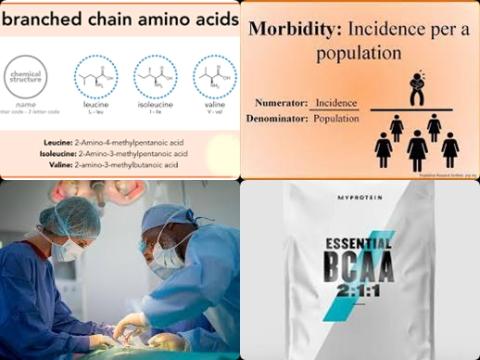
Objectives:
Branched-chain amino acids (BCAAs; leucine, isoleucine and valine) are essential amino acids involved in immune responses and may have roles in protein malnutrition and sarcopenia (a type of muscle loss (muscle atrophy) that occurs with aging and/or immobility). Furthermore, certain liver diseases have been associated with a decreased Fischer's ratio (BCAAs to aromatic amino acids; phenylalanine, tyrosine and tryptophan). However, a comprehensive synthesis of the evidence from human controlled studies on the supplemental use of BCAAs during the oncology peri-operative period has not been published. Therefore, this review article (meta-analysis) has been conducted.
Does branched-chain amino acids (BCAAs) supplementation during the oncological surgical period reduce post-operative morbidity from infections and ascites?
Study design:
This review article included 13 RCTs and 6 cohort studies with 2,019 participants.
Mean (or median) ages of the RCTs populations were from 53 to 67 years old and all of the RCTs had a predominantly male population.
9 RCTs (69%) evaluated oral intake of BCAAs and 4 (31%) administered (parenteral) BCAAs intravenously in hospital.
Duration of treatment use in the RCTs ranged from intra-operatively (single intravenous administration) up to a maximum duration of 13 months (oral administration).
Among 13 RCTs, 77% involved liver cancer. Methodological study quality scored substantial risk-of-bias across most RCTs.
Overall, 6 cohort studies were of low methodological quality.
Results and conclusions:
The investigators found meta-analysis of RCTs showed a 38% significantly decreased risk of post-operative infections in BCAAs group compared to controls [RR = 0.62, 95% CI = 0.44 to 0.87, p= 0.006, I2 = 0%, number of RCTs, k = 6, total sample size, n = 389].
The investigators found BCAAs supplementation was also beneficial for ascites [RR = 0.55, 95% CI = 0.35 to 0.86, p = 0.008, I2 = 0%, k = 4, n = 296], body weight [MD = 3.24 kg, 95% CI = 0.44 to 6.04, p = 0.02, I2 = 24%, k = 3, n = 196] and hospitalization length [MD = -2.07 days, 95% CI = -3.97 to -0.17, p = 0.03, I2 = 59%, k = 5, n = 362].
The investigators found no differences between BCAAs and controls for mortality, recurrence, other post-operative complications (liver failure, edema, pleural effusion), blood loss, quality of life, ammonia level and prothrombin time.
The investigators found no serious adverse events were related to BCAAs; however, serious adverse events were reported due to intravenous catheters. No safety concerns from observational studies were identified.
The investigators concluded that branched-chain amino acids (BCAAs) supplementation during the oncological surgical period may reduce important post-operative morbidity from infections and ascites compared to controls. May reduce because the included studies were of low methodological quality. Therefore, blinded, placebo-controlled confirmatory trials of higher methodological quality are warranted, especially using oral, short-term BCAAs-enriched supplements within the context of recent ERAS programs.
Original title:
Are Supplemental Branched-Chain Amino Acids Beneficial During the Oncological Peri-Operative Period: A Systematic Review and Meta-Analysis by Cogo E, Elsayed M, […], Papadogianis P.
Link:
https://www.ncbi.nlm.nih.gov/pmc/articles/PMC7930658/
Additional information of El Mondo:
Find more information/studies on protein and cancer right here.
Ascites is the buildup of fluid in the space around the organs in the abdomen. When ascites is caused by cancer, it is called malignant ascites.